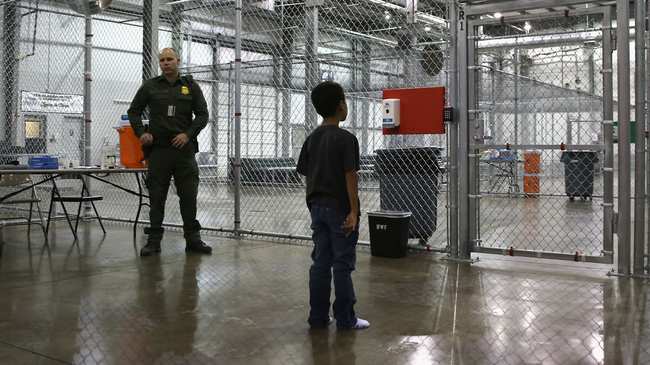
U.S. Immigration and Customs Enforcement has specified that there are at least 431 children in the United States who are unaccompanied and have no relative or anyone to represent them, since their parents, to whom they were due to be handed over, have been deported.
Not one word. Almost 24 hours have elapsed since the deadline for family reunification expired and Donald Trump has not issued any communication through his favorite “mouthpiece,” Twitter. Perhaps he has once again simply pinned the blame on the Democrats for wanting to open the borders and therefore help criminals enter the United States. But the matter is much more serious than we had hoped. There are children whose future is even more uncertain than when they were detained and separated from their families at the border.
Some 2,551 minors were due to be returned to their parents. Only 1,800 cases have been resolved. But, of these, only 1,442 have been reunited with their families; 378 were discharged under what are regarded as “appropriate circumstances,” meaning they have been entrusted to a relative, or that they reached legal age during their confinement.
The failure to meet the court-imposed deadline is serious, but the matter took a turn for the worse when the U.S. government stated that 711 of the detained minors were ineligible for reunification. By way of an explanation, or an attempt at one, it claims that some of them are children of parents with a criminal record, and that others are awaiting a decision from ICE with regard to their legal status. Furthermore, the government has specified that there are at least 431 children in the United States who are unaccompanied and have no relative or anyone to represent them, since their parents, to whom they were due to be handed over, have been deported.
How is this possible? The American Civil Liberties Union, which has been following the situation closely, has documented cases of immigrant parents who claim to have been tricked into signing documents in which they agreed to be deported.
According to their records, some were given less than a minute to sign papers in English (of which they understood little or nothing), with no guidance and in overcrowded conditions. Others received an “explanation” of what they were signing: They were told that signing the documents would allow their children to remain in the United States, but it was not made clear that they would no longer be allowed to see them. Other immigrants claimed to have been promised that their asylum requests would be accepted, but it was also not explained to them that while their case was being decided in court, they would not be allowed near their children. In this manner, thousands of parents unwittingly signed away their right to embrace their children again.
The seriousness of this conduct is nothing new. The Department of Health and Human Services stated some months ago that it had lost track of nearly 1,500 immigrant children. It does not know whether they were handed over to their families or whether they remain in the country.
These minors were not detained as a consequence of the zero tolerance policy; they crossed the border unaccompanied in 2017 and were entrusted to a sponsor, meaning someone who would take responsibility for them while their immigration status was being decided or until they were returned to their family.
This is just as serious: How can the government of the world’s most powerful country lose track of people whom it chose to entrust with the care of minors?
According to experts, there are three possible courses of action following the failure of the Trump administration to meet the deadline: It could be held in contempt of court; the reunification deadline could be extended; or the ban on deporting and separating families could be upheld.
However, the outlook is not promising because even if the authorities are given more time, what really stands out here are the conditions in which the children and their parents are being detained.
Children report waiting for up to eight hours for a glass of water, not being allowed to go to the bathroom unless they are in a group, and not being allowed to touch other children. In one case, a baby suffered a brain hemorrhage because, as a result of being held in detention, the infant did not receive the necessary medical attention.
This is the path the United States offers today to those who cross the border. Notwithstanding the wall or the bilateral work that must be done in order to make immigration a less common means for pursuing a better future, the most striking aspect of this crisis is its profound dehumanization. The image of small children inside those dreadful cages is enough to remind us of this.

Leave a Reply
You must be logged in to post a comment.